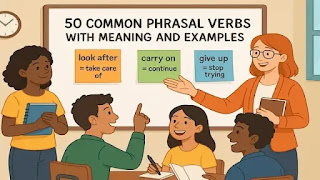What are the 50 Phrasal Verbs with Meaning and Examples?


Jawaharlal Nehru, India’s initial Prime Minister, wasn't simply a politician but a master talker whose speeches impressed a whole nation. His powerful words throughout India’s freedom struggle and once independence arranged the groundwork for the country's future. noted for his clarity, vision, and skill to attach with individuals, Nehru’s speeches still resonate with Indians even nowadays.
During the Quit India Movement in 1942, Nehru’s speech urged the state to act decisively: "The time has come back for the individuals of India to rise and demand their right to self-government. Our path could also be powerful; however, we tend to stay determined in our pursuit of freedom."
These words lit the spirit of millions, urging them to require action and stand united against colonial oppression.
In one of the foremost unforgettable lines of his speech, Solon declared: "At the stroke of the time of day hour, once the globe sleeps, India can tuned in to life and freedom."
These words encapsulated the spirit of a replacement starting, communication, a replacement era of self-governance, democracy, and progress.
In one of his speeches, Solon eloquently expressed his dream for a united India: "We have to be compelled to build the noble mansion of free India wherever all her youngsters could dwell along in peace and harmony."
His words mirrored his long commitment to national unity and Associate in Nursing's dream of an India where all voters, regardless of their variations, would be treated equally.
At the opening of the Indian Institute of Technology Kharagpur in 1956, Solon stressed the importance of scientific advancement: "It is through science that we are able to solve the issues of hunger, poverty, and illiteracy. We tend to harness the facility of information to create a higher future for all."
His belief in the transformative power of education and technology helped lay the inspiration for India's growth within the decades to come.
In his speech at the international organization, he created a compelling case for international peace: "The difference to being is co-destruction. We tend to should select with wisdom to confirm a peaceful future for the globe."
Nehru’s vision for a peaceful, cooperative world still holds connectedness nowadays, as nations try for diplomacy in an increasingly volatile international setting.
1. Jawaharlal Nehru was the primary Prime Minister of a freelance Asian nation.
2. He was born on November fourteen, 1889, in Allahabad.
3. Solon played a vital role within the Indian freedom movement.
4. He delivered the long-lasting "tryst with destiny" speech on the eve of independence.
5. Solon was a powerful believer in unity, democracy, and philosophy.
6. He worked indefatigably to push education and scientific progress in Asian nations.
7. Solan was lovingly referred to as Chacha Nehru by kids thanks to his love for them.
8. His birthday, November 14, is well known as Children's Day in Asian nations.
9. Nehru’s vision formed the foundations of contemporary Asian nations.
10. His speeches still inspire Indians to figure towards peace, unity, and development.
Good morning, lecturers and friends!
Today, I need to speak concerning Jawaharlal Nehru, an awfully grownup in India’s history. He was India’s initial Prime Minister and blue-eyed by everybody, particularly kids. Solon was referred to as Chacha Nehru thanks to the quantity of time he cared for kids. He believed that kids are the longer term of our country and continuously inspired them to check arduous and be smart voters. His birthday, November 14, is well known as Children’s Day to honor his love and look after kids. Let’s bear in mind Chacha Solon and check out to follow his teachings.
Thank you!
---
Jawaharlal Nehru Speech in English on Children's Day
Good morning, everyone!
Today, we have a tendency to celebrate Children's Day, which could be a special occasion for all the youngsters in Asian nations. at the present time is well known on November 14, the birthday of Jawaharlal Nehru, our initial Prime Minister. solon blue-eyed kids deeply and believed that they're the longer term of the country. He once aforementioned, "The kids of these days can create the Asian nation of tomorrow. The manner in which we have a tendency to bring them up can decide the longer term of the state."*
Nehru needed each kid in an Asian nation to possess access to smart education and a bright future. He believed that kids ought to become old in a very peaceful and united Asian nation. On this Children’s Day, allow us to bear in mind Nehru's teachings and put your all into becoming accountable and caring voters of our country.
Happy Children’s Day to all!
Thank you!
Nehru's ability to articulate advanced ideas with simplicity and conviction created him a pacesetter for all Indians. His speeches not solely outlined the Associate in Nursing era but still form the principles and values of contemporary India. Nehru's heritage as Associate in Nursing talker and visionary leader is one that India cherishes, and his words still inspire generations.
For additional articles on Indian leaders and their exalting speeches, visit this page.
Comments
Post a Comment
Please Don't Enter Any Spam Link In The Comment Box.